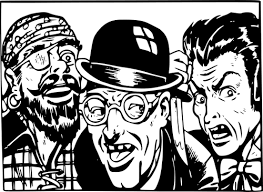- 26 Apr 2020 18:29
#15087211

Yuval Noah Harari, the author of Sapiens, writes that homo Sapien possesses a unique talent for scapegoating others using shared fiction.
Likewise, long before him, Edward Said noticed that hundreds of years of European fiction contained smears against the people of the Middle East, North Africa, and other lands that Europeans were seeking to colonize and control.
Which leads me to wonder...
Is Scapegoating the primary function of all fiction?
Is this what 'entertainment' is? The nice feeling that one gets when one is offered easy answers (scapegoats) to complex problems?
In some cases, other nations or ethnicities or religions can be used as "bad guys" in fiction (if that's who the powers-that-be need to have killed to get more power). Many genocides have been preceded by wonderful works of fiction in which "shooting bad guys" is the primary entertainment vehicle.
But in most cases it's nature itself that is scapegoated, including in fictions like religious texts, and even today's medicine (eradicate viruses, vaccinate animals and humans, destroy parasites, get rid of wolf populations, spray forests with insecticides, etc.)
Why do we use fiction to create false "easy" solutions that ultimately bring us all down?
soundtrack
Yuval Noah Harari, the author of Sapiens, writes that homo Sapien possesses a unique talent for scapegoating others using shared fiction.
Likewise, long before him, Edward Said noticed that hundreds of years of European fiction contained smears against the people of the Middle East, North Africa, and other lands that Europeans were seeking to colonize and control.
Which leads me to wonder...
Is Scapegoating the primary function of all fiction?
Is this what 'entertainment' is? The nice feeling that one gets when one is offered easy answers (scapegoats) to complex problems?
In some cases, other nations or ethnicities or religions can be used as "bad guys" in fiction (if that's who the powers-that-be need to have killed to get more power). Many genocides have been preceded by wonderful works of fiction in which "shooting bad guys" is the primary entertainment vehicle.
But in most cases it's nature itself that is scapegoated, including in fictions like religious texts, and even today's medicine (eradicate viruses, vaccinate animals and humans, destroy parasites, get rid of wolf populations, spray forests with insecticides, etc.)
Why do we use fiction to create false "easy" solutions that ultimately bring us all down?
soundtrack
The goal is to use Afghanistan to wash money out of the tax bases of the US and Europe through Afghanistan and back into the hands of a transnational security elite.
The goal is an endless war, not a successful war.
— Julian Assange
The goal is an endless war, not a successful war.
— Julian Assange











 - By Tainari88
- By Tainari88 - By Pants-of-dog
- By Pants-of-dog